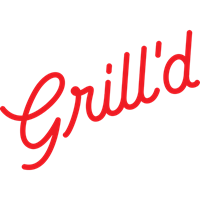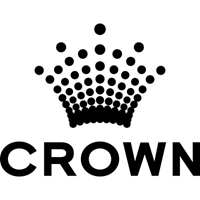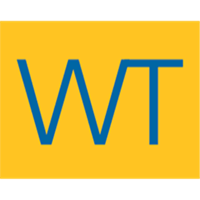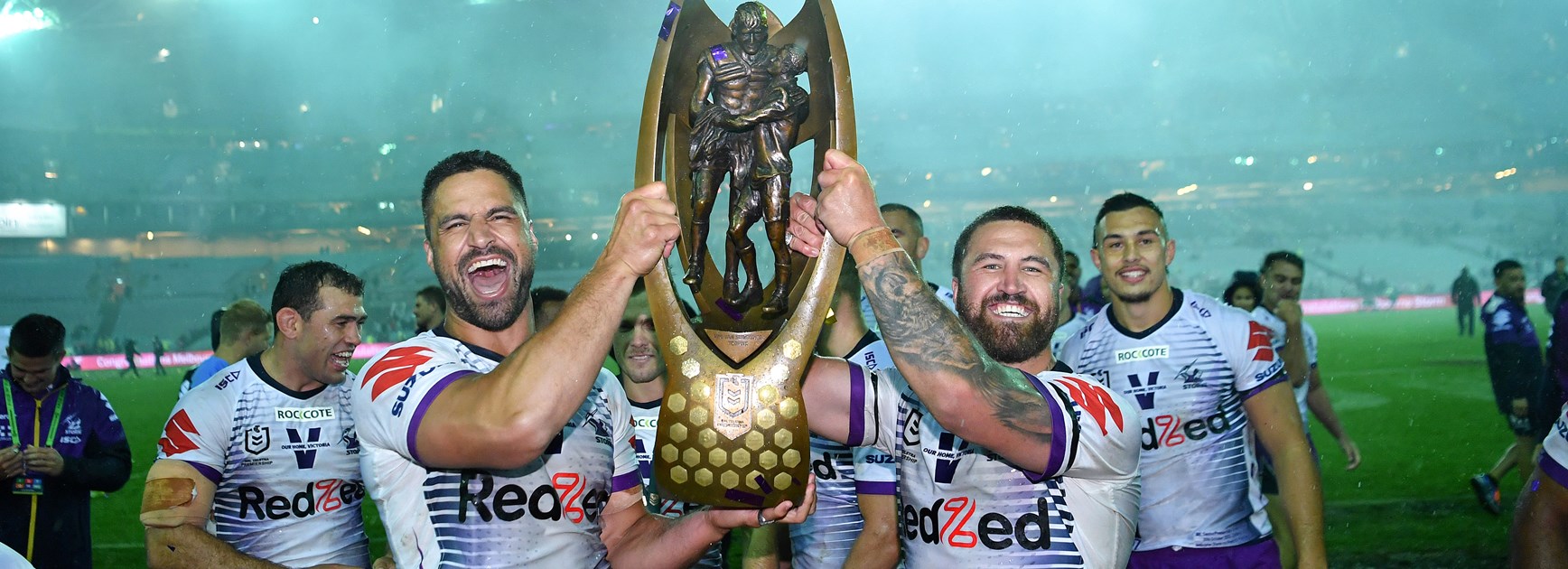
Not even the disruption of living away from home for more than four months could derail the Storm's quest for their third premiership in the past nine years.
COVID-19 restrictions meant the Melbourne squad had to base themselves at a Sunshine Coast resort from late June onwards.
Before that they'd already had a brief stint in Albury in the lead-up to the competition resuming from the coronavirus-prompted break.
But the situation only strengthened the team's bond and it showed on the field as the Storm lost just four games all year en route to defeating the Penrith Panthers 26-20 in the grand final.
Captain Cameron Smith was outstanding in what may have been his final season and he had star-powered support from the likes of Cameron Munster, Josh Addo-Carr and a fearsome forward pack.
However, it was the full emergence of some young stars and late bloomers that really defined Melbourne's super season.
Ryan Papenhuyzen became a premier fullback, halfback Jahrome Hughes's rapid development continued, centres Justin Olam and Brenko Lee enjoyed breakout campaigns and Titans-bound forward Tino Fa'asuamaleaui signed off from the club in style.
With master coach Craig Bellamy at the helm in 2021, the machine-like Storm look to have set themselves up for another dominant era.
Home and Away record
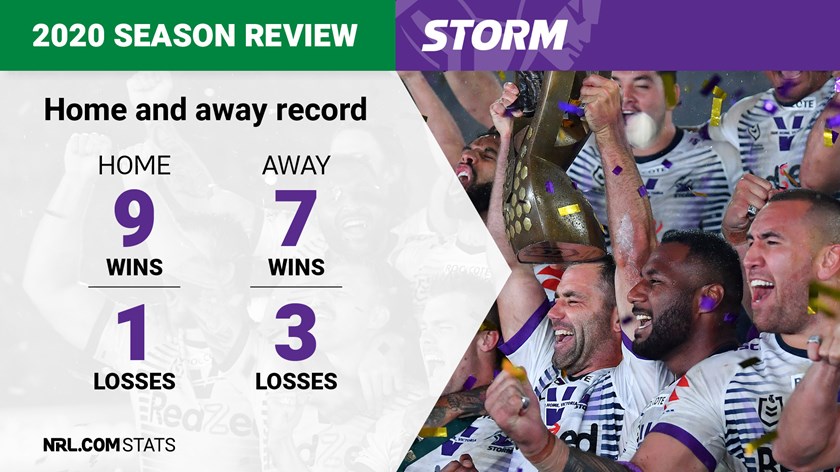
Melbourne only got to play two games at their usual base of AAMI Park before the COVID-19 pandemic forced them to head north.
They hosted one game at Kogarah's Netstrata Jubilee Stadium, beating the Warriors in round seven. Next, the Storm played a one-off home match at Suncorp Stadium – a classic win over the Roosters.
Their remaining six home fixtures were at Sunshine Coast Stadium. It became a fortress, with Melbourne going undefeated at the venue.
The team's biggest win was the aforementioned clash with the Warriors (50-6), while their heaviest loss was inflicted by the Raiders in round three (22-6) at AAMI Park when the competition resumed.
Run metres differential
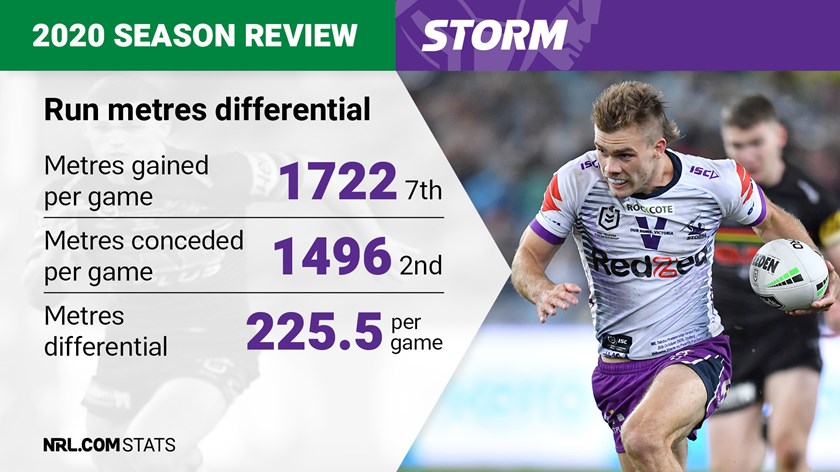
While Melbourne carried the ball strongly, averaging 1722m per match (seventh in the league), they strangled teams in defence.
The Storm conceded a miserly average of 1496m per match – the second-best return behind the Panthers (1457m).
They also had the second-best run metres differential of 225.5.
Given they were able to pin opponents inside their own half, Melbourne often earned the luxury of starting sets further downfield. They spent 52.2 percent of the time inside enemy territory.
Try scoring – game time
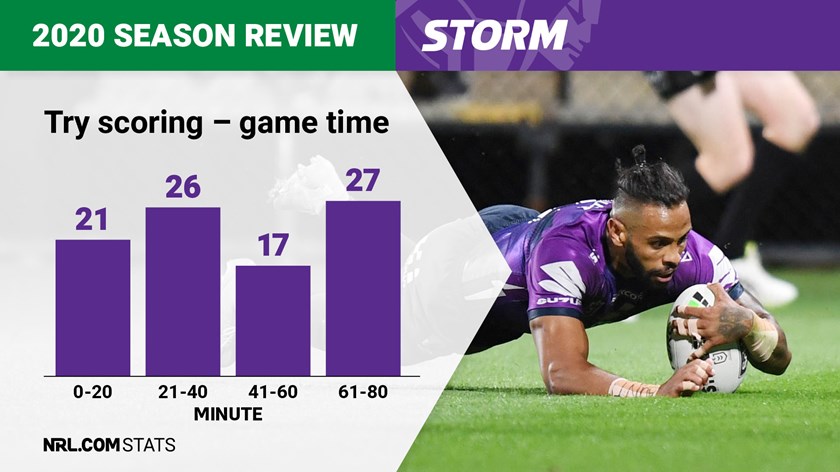
Bellamy's boys proved to be an attacking juggernaut capable of scoring from anywhere. They posted an impressive 91 tries in the regular season (third in league) at an average of 4.55 per match.
The Roosters scored a competition-high 94 tries across 20 rounds, followed by minor premiers Penrith (92).
The Storm refused to take their foot off the pedal as games wound down, piling on a total of 27 four-pointers in the final 20 minutes.
Flying winger Josh Addo-Carr led the way for the team with 15 tries – including five doubles – before the finals.
Tries conceded – game time
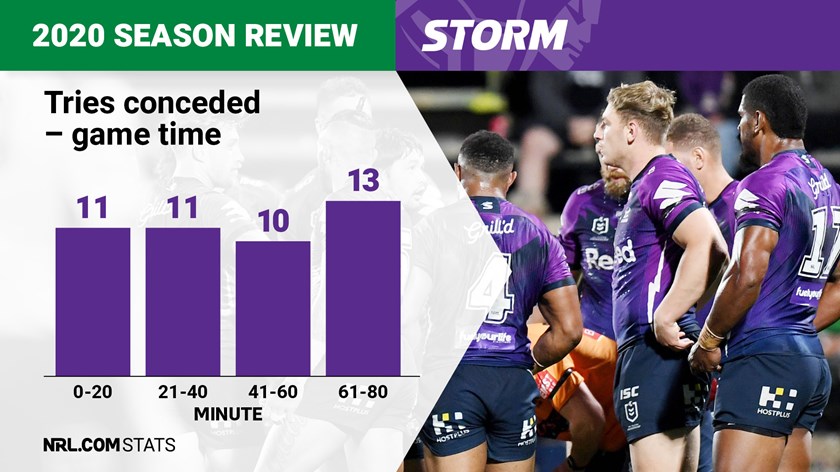
A mere 45 tries were conceded in the regular season by Melbourne, with only the Panthers (41) bettering that effort.
Breaking through the purple wall wasn't easy at any stage, but a few minor cracks appeared later in games. Melbourne leaked 13 tries in the final 20 minutes of matches, the most of any quarter.
Tries scored from six-agains
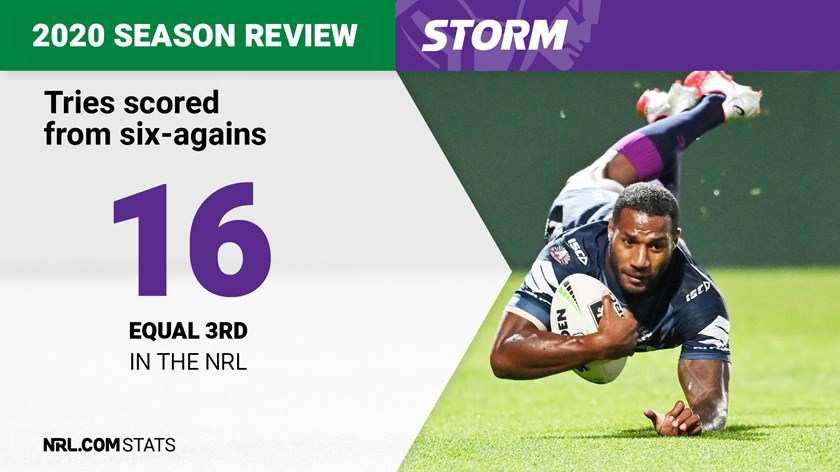
Blessed with Cam Smith's sharp mind at hooker and plenty of pace and cunning around him, the Storm adapted well to the six-again rule – scoring 16 tries following ruck infringements including finals (equal-third overall), with 14 coming during the regular season.
Not bad for a team that admitted they needed to tweak their structure to fit the change after losing to Canberra in round three.
Metres gained from offloads
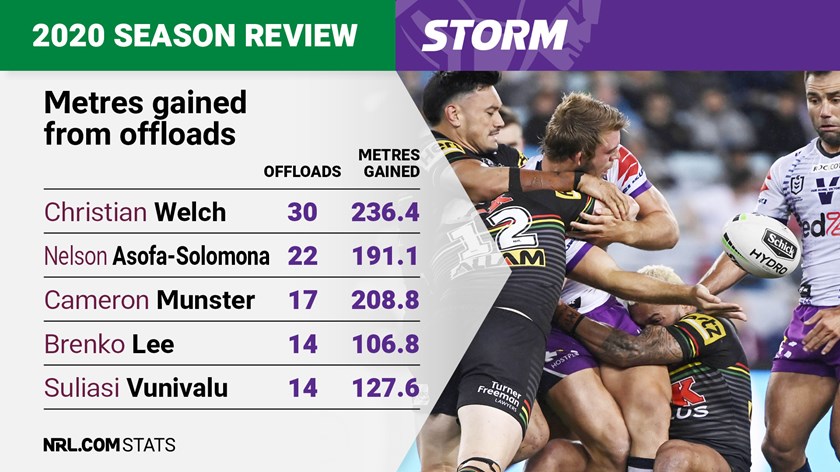
Prop Christian Welch has skill to go with strength, something evidenced by his team-high 30 offloads for a gain of 236.4 metres.
Fellow front-rower Nelson Asofa-Solomona (22 offloads, 191.1 metres) also made a habit of promoting the Steeden.
Melbourne produced the fourth-most offloads (205) from which they gained the third-most metres (1462.9).
Parramatta led the way in both metrics with 276 offloads for 1834.6m.
Goal-kicking accuracy
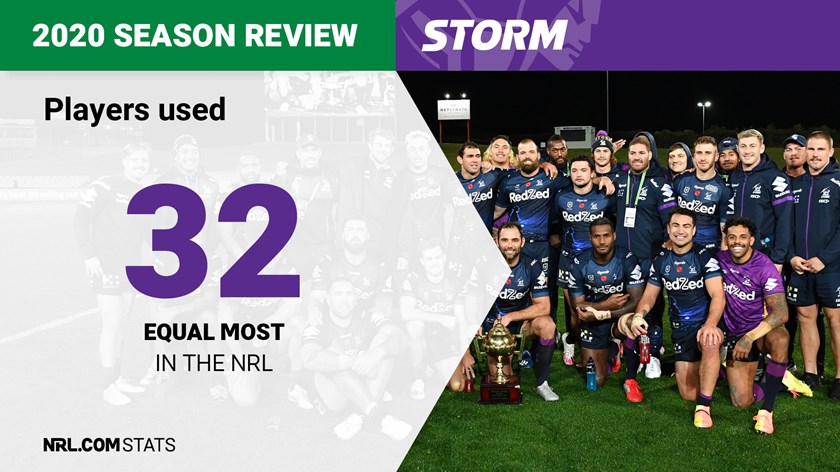
The Storm didn't let many points go begging, with their goal-kicking success rate of 80 percent the third-best in the competition. South Sydney boasted the highest rate (84.6%).
Melbourne landed 84 of 105 goal attempts. Cameron Smith was the team's chief kicker, knocking over 70 goals from 84 shots in the regular season (83.3%) including 11 penalties.
Players used

The decision to rest players and blood two debutants in the final round meant Melbourne used 32 players all-up – the equal-most in the league alongside the Warriors, Raiders and Broncos.
A few injury concerns came the Storm's way, with the likes of Cameron Smith, Cameron Munster, Ryan Papenhuyzen, Dale Finucane and Brandon Smith all missing games at different points.
But Melbourne's depth shone, with six players making their NRL debuts for the club in 2020 – Aaron Booth, Cooper Johns, Chris Lewis, Isaac Lumelume, Aaron Pene and Darren Schonig.
Experience
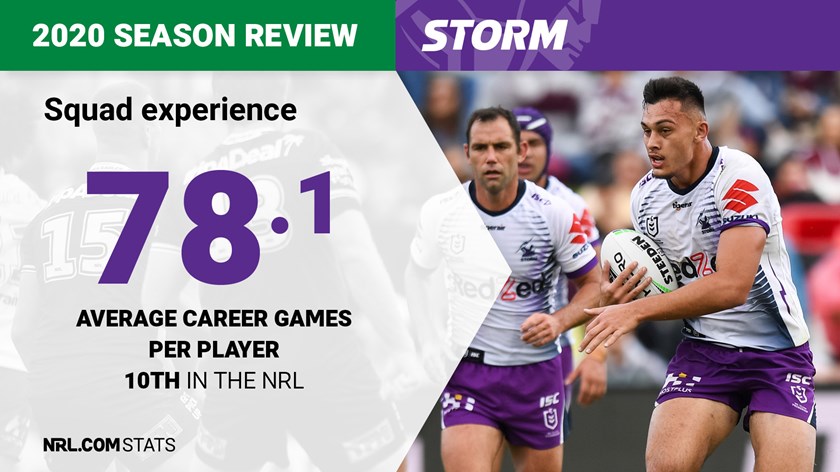
While the Roosters fielded a team of veteran campaigners amounting to a season-high average of 103.8 NRL games per squad member, Melbourne ranked 10th with an average of 78.1 appearances.
The Storm and their grand final opponents Penrith (66.4 games, 16th) were the only top-four teams in the bottom half of this metric, with third-placed Parramatta (92.2 games) finishing behind the Roosters.
Tackle efficiency
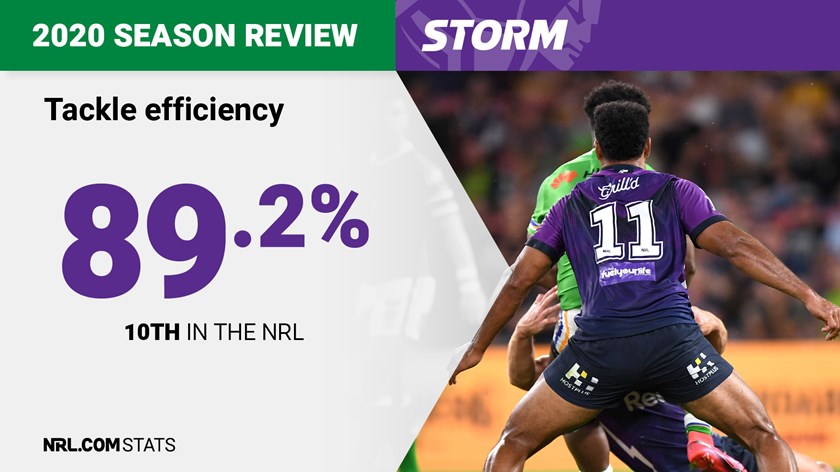
The Storm came in 10th with a tackling efficiency of 89.19 percent across the regular season, though they weren't far off the top-ranked Dragons (90.63 percent).
Melbourne averaged the second-fewest missed tackles per match with 25.1. South Sydney (24.3) were first.
2020 Form Guide
| Round | Opposition | Venue | Result |
|---|---|---|---|
| 1 | Sea Eagles | Lottoland, Sydney | Won 4-18 |
| 2 | Sharks | Netstrata Jubilee Stadium, Sydney | Won 10-12 |
| 3 | Raiders | AAMI Park, Melbourne | Lost 6-22 |
| 4 | Rabbitohs | AAMI Park, Melbourne | Won 22-8 |
| 5 | Knights | Central Coast Stadium, Central Coast | Won 12-26 |
| 6 | Panthers | Campbelltown Stadium, Sydney | Lost 21-14 |
| 7 | Storm | Netstrata Jubilee Stadium, Sydney | Won 50-6 |
| 8 | Roosters | Suncorp Stadium, Brisbane | Won 27-25 |
| 9 | Raiders | GIO Stadium, Canberra | Won 14-20 |
| 10 | Titans | Sunshine Coast Stadium, Sunshine Coast | Won 42-6 |
| 11 | Broncos | Suncorp Stadium, Brisbane | Won 8-46 |
| 12 | Knights | Sunshine Coast Stadium, Sunshine Coast | Won 26-16 |
| 13 | Bulldogs | Sunshine Coast Stadium, Sunshine Coast | Won 41-10 |
| 14 | Roosters | Sydney Cricket Ground, Sydney | Won 6-24 |
| 15 | Eels | Bankwest Stadium, Sydney | Lost 14-0 |
| 16 | Sea Eagles | Sunshine Coast Stadium, Sunshine Coast | Won 30-6 |
| 17 | Rabbitohs | ANZ Stadium, Sydney | Won 16-22 |
| 18 | Cowboys | Sunshine Coast Stadium, Sunshine Coast | Won 36-20 |
| 19 | Wests Tigers | Sunshine Coast Stadium, Sunshine Coast | Won 50-22 |
| 20 | Dragons | Netstrata Jubilee Stadium, Sydney | Lost 30-22 |
| Finals week 1 | Eels | Suncorp Stadium, Brisbane | Won 36-24 |
| Finals week 3 | Raiders | Suncorp Stadium, Brisbane | Won 30-10 |
| Grand Final | Panthers | ANZ Stadium, Sydney | Won 20-26 |




